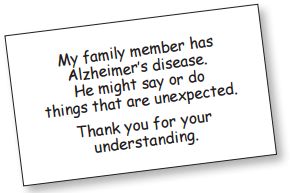Plan Ahead for Outings
Here are some tips to make outings fun:
- Plan outings for the time of day when the person with Alzheimer’s is at his or her best.
- Keep outings from becoming too long. Take note of how tired the person gets after a certain amount of time. Bring the person home before he or she becomes overtired.

- Use a business-size card to tell others about the person’s disease. Sharing this information with store clerks or restaurant staff can make outings more comfortable for everyone. My family member has Alzheimer’s disease. He might say or do things that are unexpected. Thank you for your understanding.
Eating Out
Going out to eat can be a welcome change, but it can also be challenging. Planning can help. Before choosing a restaurant, think about its layout, menu, noise level, waiting times, and the helpfulness of the staff. Ask yourself:
- Does the person with Alzheimer’s disease know the restaurant well?
- Is it quiet or noisy most of the time?
- Are tables easy to get to? Do you need to wait before being seated?
- Is the service quick enough to keep the person from getting restless?
- Does the restroom meet the person’s needs?
- Are foods the person with Alzheimer’s likes on the menu?
- Is the staff understanding and helpful?
Before going to the restaurant, decide if it is a good day to go. If it is, think about the best time to go. Earlier in the day may be best, so the person with Alzheimer’s is not too tired. Also, the restaurant may be less crowded, and service may be quicker. If you decide to go later, try to get the person to take a nap first.
Before you leave home, gather what you need. Helpful items may include utensils, a towel, wipes, or bathroom items.
At the Restaurant
- Tell the waiter or waitress about any special needs, such as extra spoons, bowls, or napkins.
- Ask for a table near the restroom and in a quiet area. Seat the person with his or her back to busy areas.
- Help the person choose a meal, if needed. Suggest food you know the person likes. Read parts of the menu or show the person pictures of the food. Limit the number of choices.
- Ask the server to fill glasses half full or leave the drinks for you to serve.
- Order finger food or snacks to hold the attention of the person with Alzheimer’s.
- Go with the person to the restroom. Go into the stall if the person needs help. For more caregiving tips and other resources:
MORE INFORMATION:
- The Alzheimer’s Disease Education and Referral (ADEAR) Center is a service of the National Institute on Aging, part of the National Institutes of Health. The Center offers information and publications for families, caregivers, and professionals about Alzheimer’s disease and age-related cognitive changes.
SOURCE:
- National Institute on Aging National Institutes of Health NIH…Turning Discovery Into Health®





If you are the opposite sex caregiver: Early in the disease, check to see which of your favorite places to go (restaurants, museums, CHURCHES)have family restrooms. Eventually (and much sooner than you think), your loved one will need assistance and, like so many other things, it is essential to plan ahead for that eventuality. Being proactive is the First Commandment of caregiving. Restrooms can differ substantially just in how you dry your hands. Paying a little attention now can make a great difference in your quality of life not too long from now!!
In Orchard House we arrange different activity for people with dementia.
they enjoy the each activity. special food are arranged for them as per their needs.